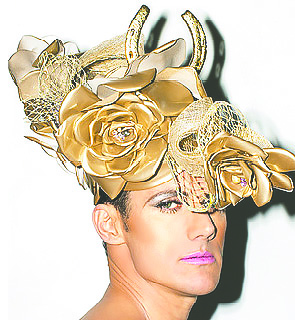The playwright is well known for her masterly drawing together of verbatim sources and subsequent transformation into a vital piece of socially relevant theatre. The choosing of this technique seems to suggest that Valentine is only prepared to reveal as much of her own identity as can be deduced from the often tender but always provocative way her material is assembled. Her intention is always to offer solace to the traumatised, to seek resolution of interpersonal and social tensions and to assuage despair by offering hope. However, in Ladies Day Valentine surprises us by making her own technique a thematic concern of the play, and, in addition, apparently placing revenge at its centre.
The action of the play is initiated by the invitation of Liam (Matthew Backer) to his friend Mike (Wade Briggs) aka Madame Ovary to travel to Broome for Ladies Day. The repartee between the two as they speak on the phone establishes the lively, forthright tone of the play and the friends’ differing characters. It tells us that Liam wants more of Mike than friendship and that Mike is very witty but angry. When Mike agrees, the tour of pink Broome as promised by the rollicking introductory barbershop song, “The queers in Broome are quite ill-groomed …” might seem in the offing, tempered by vicissitudes of a Liam/Mike relationship.
The introduction of Lorena (Lucia Mastrantone) immediately following subverts this expectation with an edgy monologue linking the themes of sex and the difficulty of revealing to others what she is really like inside. Lorena confides that she is putting herself in her own play, a story of a writer who goes to Broome, and what happens to her. In following scenes she carries her recorder and places it between her and her interviewees, referencing the separation between their roles. At times she seems like a puppet master eliciting personal details from Rodney (Elan Savelsky) although he initially proclaims his disinterest. We understand why he confides in Lorena. Everyone likes to tell their story to someone who seems ready to listen; who is empathetic. Perhaps we don’t think so much, or at all, about the listener or what has driven her not only to take up her role of confessor to the victimised but also to believe in their story.
Lorena’s sad and touching revelation is at the heart of the play. However, ready as Lorena is to admit to us, with suitable indignation, that she can be hoodwinked at the denouement, would she be as ready to admit that she can deceive us: tell us what we would like to believe? Lorena is a creation, after all, and perhaps we should not confuse the creation with the creator. Up to you, playgoers, to answer: yes, no, maybe.
Confronting and funny, brutal and compassionate, Alana Valentine’s Ladies Day reaches two important benchmarks of the best theatre: the 100 minutes duration seems like half an hour and as the play gets underway we cease to notice actors but see other people. Praise to the playwright for mastery of her trade, and to the cast for bringing good writing into painful and convincing life. Praise to the production creatives (James Brown, Hugh Hamilton, Max Lambert, Roger Lock and Cara Woods) for the beautifully economic set and for the several songs that acted as a classical chorus.






